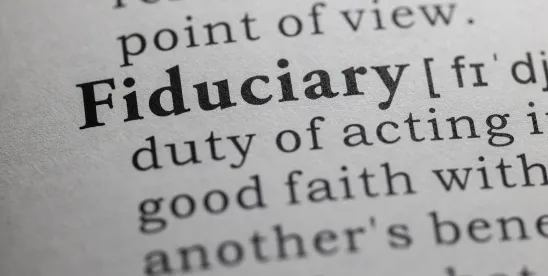The Department of Labor ("DOL") recently issued a regulatory package that includes a final rule updating ERISA’s definition of an investment advice fiduciary and amending certain related prohibited transaction exemptions ("PTEs"). This is the DOL's third attempt to modernize the definition of an investment advice fiduciary to more completely reflect the modern retirement plan landscape. The regulatory package is generally effective September 23, 2024, with some parts of the PTE amendments being gradually phased in and fully effective September 23, 2025.
Since none of the DOL's prior attempts at updating the definition of an investment advice fiduciary have been successful, the original test from 1975 has remained in place. The 1975 test was drawn up when retirees' retirement savings were almost exclusively housed in employer-sponsored defined benefit plans. The concept of a 401(k) plan did not exist at that time. Today, significant portions of retirement savings are held in 401(k) plans, individual retirement accounts (IRAs), and/or other defined contribution plans, instead of defined benefit plans. This means that more participants and retirees oversee and manage their own retirement savings. According to the DOL, the nearly 50-year-old definition of an investment advice fiduciary does not provide adequate protection for participants in today’s world.
To create a fiduciary relationship under the old standard, advice must have been provided to a particular recipient on a regular basis and pursuant to a mutual understanding. The final rule broadens the definition by defining an investment advice fiduciary as a person that:
1. Makes a recommendation to a retirement investor that relates to securities transactions, investment transactions, investment strategy, or a recommendation that relates to securities or investment property of a plan or IRA to a retirement investor; and
2. Either:
- Directly or indirectly makes professional investment recommendations to investors on a regular basis as part of their business, and the recommendation is made under circumstances that would lead a reasonable investor to believe: (i) that the recommendation is based on a review of the investor’s particular needs; (ii) that the recommendation was made using professional judgment; and (iii) that the investor may rely on the recommendation as advice that is intended to promote the investor’s best interests; or
- The person represents or acknowledges that they are acting as a fiduciary under ERISA with respect to the recommendation.
In the final rule, the DOL specifies what types of recommendations are contemplated by the definition, importantly including that advice related to rollover transactions and investments post-rollover can be considered fiduciary advice.
While this guidance is primarily targeted at the investment advisor and participant communities, there are two primary takeaways for plan sponsors:
1. The regulations clarify that information provided by sponsor employees, such as HR staff, will generally not cause the employee to become a fiduciary, provided it is merely educational in nature and does not constitute a recommendation or "call to action." This is not necessarily new, but is a good reminder that HR staff should not provide advice on investments, distributions, etc. Instead, participants should merely be advised to consult with their own financial and tax advisors.
2. Sponsors should confirm whether their investment consultants are providing advice in a fiduciary capacity. This should ideally be confirmed in a written agreement.
As with previous iterations of the DOL's attempts to modernize the fiduciary rules, this regulatory package was almost immediately met with litigation. In Federation of Americans for Consumer Choice, et al v U.S. DOL, the plaintiffs are challenging the rule on the grounds of regulatory overreach. Notably, this suit was filed in the Fifth Circuit which invalidated the DOL's prior attempt at rulemaking on this topic and tends to be a favorite among groups seeking to overturn governmental regulation.
We will continue to monitor any developments in litigation, as well as monitor this regulatory package for further industry guidance or commentary from the DOL on these topics. Please reach out to the authors or your Miller Canfield attorney with any questions or for additional information.






 />i
/>i
